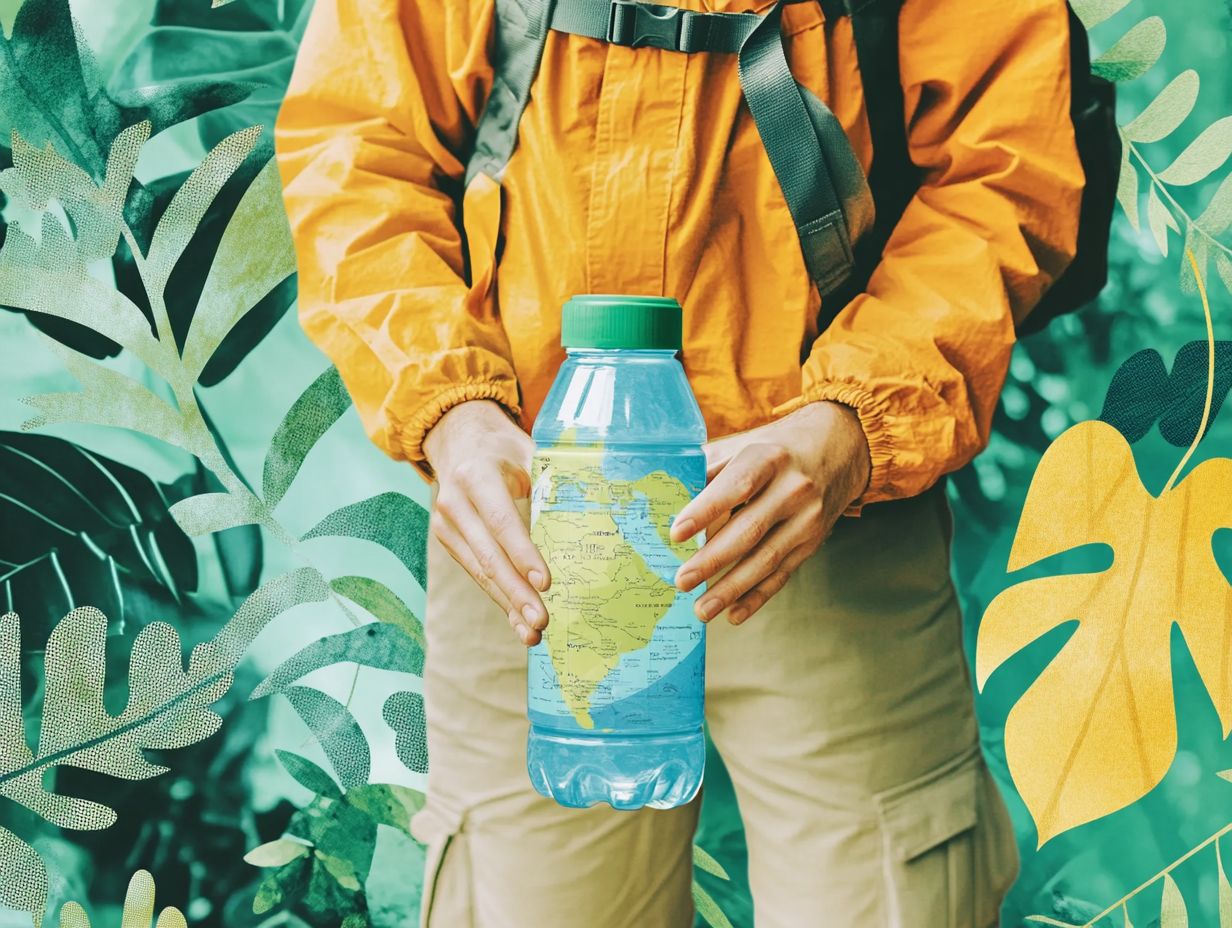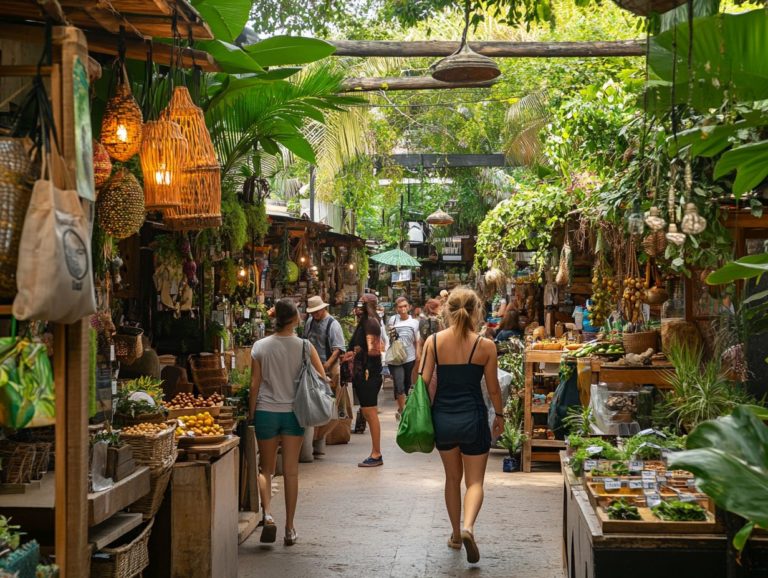How to Identify Sustainable Travel Brands
In a world increasingly shaped by climate change and social inequality, sustainable travel stands out as an essential consideration for the discerning traveler. This is particularly important in an era marked by misleading marketing and the quest for eco-conscious options.
This article delves into the significance of selecting sustainable brands. Your choices can reduce environmental impact while fostering social and economic responsibility. We will emphasize the importance of ethical tourism and community development.
You ll be guided through the criteria for identifying genuinely sustainable travel brands. You’ll get insightful tips for researching your options, along with inspiring case studies of companies that prioritize environmental sustainability and conservation projects.
By the end, you can make informed decisions that enhance your travel experience while contributing positively to the world, ensuring your travel choices align with sustainable practices.
Contents
- Key Takeaways:
- The Importance of Sustainable Travel
- Criteria for Identifying Sustainable Travel Brands
- Researching and Evaluating Brands
- Examples of Sustainable Travel Brands
- Tips for Supporting Sustainable Travel
- Frequently Asked Questions
- 1. How can I identify sustainable travel brands?
- 2. What are some key characteristics of sustainable travel brands?
- 3. Is it important to research a company’s sustainability efforts before booking with them?
- 4. Are there any red flags to look out for when trying to identify sustainable travel brands?
- 5. Can I trust a company’s self-proclaimed sustainability efforts?
- 6. Are there any resources available to help me identify sustainable travel brands?
Key Takeaways:

- Choose sustainable travel brands to reduce negative environmental impact and promote responsible and ethical tourism practices, avoiding the pitfalls of misleading marketing and low-quality offsets.
- Evaluate brands based on their environmental impact, social responsibility, and economic sustainability, while staying mindful of the perception of sustainability in the travel industry.
- Conduct thorough research and ask key questions to identify and support sustainable travel brands, ensuring that you understand their environmental claims and label credibility.
The Importance of Sustainable Travel
Sustainable travel has emerged as a vital consideration in today s travel landscape. It focuses on reducing environmental impact, promoting ethical tourism, and encouraging eco-friendly practices that benefit both travelers and local communities.
The pressing need to combat environmental degradation inspires travelers like you to seek conscientious options that align with sustainability efforts. As a result, it is essential for travel companies to embrace practices that demonstrate corporate responsibility and accountability toward the environment.
By choosing sustainable travel, you enhance your own experiences and contribute to a more ethically aware society, ensuring a positive legacy for generations to come.
Why Choosing Sustainable Brands Matters
Choosing sustainable brands is essential for travelers who wish to align their travel choices with personal values. In an era where greenwashing can often obscure a brand’s true commitment to sustainability, your choices matter.
By selecting companies that genuinely prioritize eco-friendly practices, you contribute to a marketplace that values transparency and holds brands accountable. This heightened scrutiny combats misleading marketing and enables you to make informed decisions that can significantly impact the environment, ultimately reducing your carbon footprint.
When you commit to supporting sustainable brands, you play a pivotal role in fostering a responsible travel culture. Your actions inspire others to reflect on the ecological impact of their choices. To deepen your understanding, consider exploring sustainable travel: key principles to follow. Over time, these collective decisions can lead to a noteworthy reduction in carbon footprints, promoting a healthier planet for generations to come.
Criteria for Identifying Sustainable Travel Brands
Identifying sustainable travel brands is crucial for discerning travelers like yourself. You seek to make informed choices that prioritize positive environmental practices, foster community development, and embrace ethical tourism all while striving for carbon neutrality.
Take action now. Start researching and supporting sustainable brands to make a difference in your travel experiences!
Environmental Impact
The environmental impact of your travel choices can be profound. It influences everything from local ecosystems to global climate change. This makes ecological awareness essential for anyone seeking sustainable experiences.
As you embark on journeys across the globe, you’ll often find yourself at a crossroads between exploration and responsible stewardship of our planet. Opting for places to stay that are good for the environment or participating in conservation efforts allows you to help protect fragile habitats and support local communities.
The allure of mass tourism can lead to harmful practices, like overdevelopment in pristine areas and excessive waste generation. Recognizing this balance is crucial for our adventures! By cultivating a deeper connection to the places you visit, you foster a shared responsibility to sustain the beauty and integrity of our world.
Social Responsibility

Social responsibility in travel goes beyond environmental concerns. It highlights the profound impact of tourism on local communities and animal welfare, stressing the necessity of ethical tourism practices.
By prioritizing responsible tourism, you can help build strong, mutually beneficial relationships between visitors and residents. This approach enriches your travel experience and creates economic opportunities for the community, ensuring that tourism benefits resonate locally.
Brands that embrace this ethos often support animal welfare, backing sanctuaries and raising awareness about wildlife conservation. They encourage you to engage in activities that honor local ecosystems and promote environmental sustainability.
Your commitment to ethical practices enhances the appeal of your destinations and significantly contributes to the well-being and resilience of both communities and wildlife.
Economic Sustainability
Economic sustainability in the travel sector ensures that tourism fosters socio-economic progress without compromising the well-being of local communities or depleting natural resources.
By embracing sustainable practices, you elevate the travel experience and create significant economic advantages for yourself and the destinations you explore. This approach encourages the preservation of local cultures, promotes eco-friendly hotels, and supports local artisans, cultivating a vibrant economy that directly enriches communities.
Implementing sustainable initiatives may be challenging, with the need for proper education and training for local stakeholders and potentially higher costs associated with sustainable products. However, you can navigate these hurdles to ensure that the benefits are distributed fairly, securing a win-win for everyone involved.
Researching and Evaluating Brands
Researching and evaluating brands is vital for travelers wishing to support sustainable tourism. This process helps you distinguish between authentic sustainability efforts and misleading marketing tactics, ensuring trust in the credibility of the labels you encounter.
Where to Find Information
You can find valuable information about sustainable brands through various sources, including travel guides, sustainability reports, and authentic consumer reviews sharing real experiences.
Dive into platforms dedicated to sustainable travel, like eco-focused websites and vibrant social media groups, to gain deeper insights into various brands’ practices. Consulting reputable third-party certifications such as Green Globe or the Global Sustainable Tourism Council reassures you about a company’s commitment to sustainability. Additionally, learning how to identify sustainable travel spots can further enhance your travel choices.
Engaging with local community initiatives or reading articles from respected environmental organizations further enriches your understanding of responsible tourism. Thorough research enables informed choices and fosters a positive impact on the global travel landscape.
Key Questions to Ask
Asking the right questions is very important for you as a traveler to assess the authenticity of sustainable travel brands and their environmental claims. This approach helps travelers understand better and enables you to make informed decisions that reflect your travel responsibilities.
Consider how transparent a brand is about its practices, especially concerning sourcing and production. Are they forthright about their supply chains and the materials they utilize?
Evaluating a brand’s environmental impact reveals important details about its commitment to sustainability. What specific measures are they implementing to minimize carbon footprints and reduce waste?
Community engagement is another vital factor. You should inquire about how a brand supports local communities and whether it prioritizes ethical partnerships that ensure fair compensation.
These reflections not only enhance your personal travel experiences but also contribute to a more responsible travel industry overall.
Examples of Sustainable Travel Brands

Examples of sustainable travel brands stand as inspiring case studies. They demonstrate how effective environmental practices can craft unforgettable travel experiences while simultaneously supporting impactful travel initiatives.
Case Studies of Successful Sustainable Brands
Case studies of successful sustainable brands like G Adventures and Intrepid Travel showcase creative ways to engage with environmental practices and community engagement that truly resonate with eco-conscious travelers.
These organizations exemplify how well-targeted strategies can forge meaningful connections between tourists and local communities. They elevate the travel experience while championing environmental stewardship.
By embracing initiatives such as carbon offsetting programs and partnerships with grassroots organizations, they effectively minimize their ecological footprint while uplifting local economies.
Incorporating educational components, like workshops and tours led by local guides, fosters a deeper understanding of the cultural heritage and environmental challenges these regions face. This not only enriches your journey as a traveler but also ensures that the benefits of tourism are shared more equitably among those who call these beautiful places home.
How These Brands Align with Criteria
Understanding how sustainable travel brands align with established criteria, such as environmental impact and social responsibility, offers you valuable insight into their genuine commitment to authentic sustainability efforts.
These brands embrace innovative practices that not only minimize their carbon footprints but also actively involve local communities. Some focus on sourcing materials and services locally, ensuring that a significant portion of your travel spending benefits the surrounding economy. For more insights, check out the top sustainable travel practices to follow.
Others launch programs dedicated to protecting natural habitats and wildlife, turning you into a conservation advocate. By prioritizing ethical partnerships and maintaining transparent operations, these brands elevate your overall travel experience.
This allows you to connect deeply with the places you explore while fostering a sense of responsibility for the environment and cultures you encounter.
Tips for Supporting Sustainable Travel
Supporting sustainable travel is within your reach. It starts with practical tips that enable you to make eco-conscious choices. By embracing these strategies, you can fulfill your travel responsibilities toward both the environment and the local communities you visit.
Start your sustainable journey today with these simple steps!
Practical Ways to Make a Difference
Adopt practical ways to make a difference. Weave eco-friendly practices into your travel plans, promote carbon neutrality, and champion sustainable tourism.
Select accommodations that prioritize renewable energy and minimize waste. By doing so, you directly contribute to the preservation of local ecosystems.
Engage in conservation projects during your travels. This not only helps protect endangered species but also restores vital natural habitats.
Make simple choices, like opting for public transportation or biking instead of renting a car. These actions significantly reduce the amount of pollution caused by your travels.
Every choice matters. Small actions can lead to big changes for our planet!
This creates a ripple effect that transforms sustainable tourism into the new standard, especially with tips for sustainable business travel.
Frequently Asked Questions

1. How can I identify sustainable travel brands?
One way to identify sustainable travel brands is to look for certifications from independent organizations that assess a company’s sustainability practices, such as Green Key or EarthCheck.
2. What are some key characteristics of sustainable travel brands?
Sustainable travel brands typically prioritize environmentally-friendly practices, support local communities, and commit to social responsibility.
3. Is it important to research a company’s sustainability efforts before booking with them?
Yes, research a company’s sustainability efforts before booking with them to support businesses that align with your values and promote sustainable travel practices.
4. Are there any red flags to look out for when trying to identify sustainable travel brands?
Yes, some red flags to look out for include a lack of transparency about their sustainability efforts, no certifications or awards, and a disregard for the local environment or community.
5. Can I trust a company’s self-proclaimed sustainability efforts?
While it’s a good start, self-proclaimed sustainability efforts should be backed up by third-party certifications or audits for greater credibility and transparency.
6. Are there any resources available to help me identify sustainable travel brands?
Yes, resources such as Sustainable Travel International’s Sustainable Travel Directory and the Green Traveler Collection provide a list of verified sustainable travel brands and accommodations.






